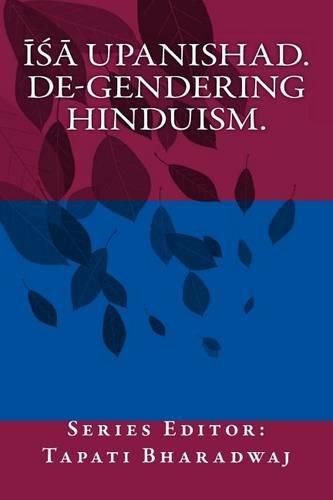Readings Newsletter
Become a Readings Member to make your shopping experience even easier.
Sign in or sign up for free!
You’re not far away from qualifying for FREE standard shipping within Australia
You’ve qualified for FREE standard shipping within Australia
The cart is loading…






This rendition of an Upanishadic text is but a part of a larger series; the aim of this work is to construe Hindu religious texts as literature, and examine them within a gendered inflected analytical framework. What prevents us from examining the Upanishadic or the Vedic texts within a literary or a gendered perspective? If the basis of religion is revealed knowledge, which was made evident to men - then is it not obvious that these notions of the Absolute Being would but be defined within gender inflected terminologies? The personal gender-biases of men would affect and predetermine how the notions of the Supreme Being were written about.Extracts from the ISA UPANISHAD.2. By doing karma, indeed, should one wish to live here for a hundred years. For a person, such as you (who wants to live thus), there is no way other than this, whereby karma may not cling to you.6. S/he who sees all beings in the Self itself, and the Self in all beings, feels no hatred by virtue of that (realization).8. S/he is all-pervasive, pure, bodiless, without wound, without sinews, taintless, untouched by sin, omniscient, ruler of mind, translucent, and self-existent; s/he has duly allotted the (respective) duties to the eternal years (i.e. to the eternal creators called by that name).
$9.00 standard shipping within Australia
FREE standard shipping within Australia for orders over $100.00
Express & International shipping calculated at checkout
This rendition of an Upanishadic text is but a part of a larger series; the aim of this work is to construe Hindu religious texts as literature, and examine them within a gendered inflected analytical framework. What prevents us from examining the Upanishadic or the Vedic texts within a literary or a gendered perspective? If the basis of religion is revealed knowledge, which was made evident to men - then is it not obvious that these notions of the Absolute Being would but be defined within gender inflected terminologies? The personal gender-biases of men would affect and predetermine how the notions of the Supreme Being were written about.Extracts from the ISA UPANISHAD.2. By doing karma, indeed, should one wish to live here for a hundred years. For a person, such as you (who wants to live thus), there is no way other than this, whereby karma may not cling to you.6. S/he who sees all beings in the Self itself, and the Self in all beings, feels no hatred by virtue of that (realization).8. S/he is all-pervasive, pure, bodiless, without wound, without sinews, taintless, untouched by sin, omniscient, ruler of mind, translucent, and self-existent; s/he has duly allotted the (respective) duties to the eternal years (i.e. to the eternal creators called by that name).